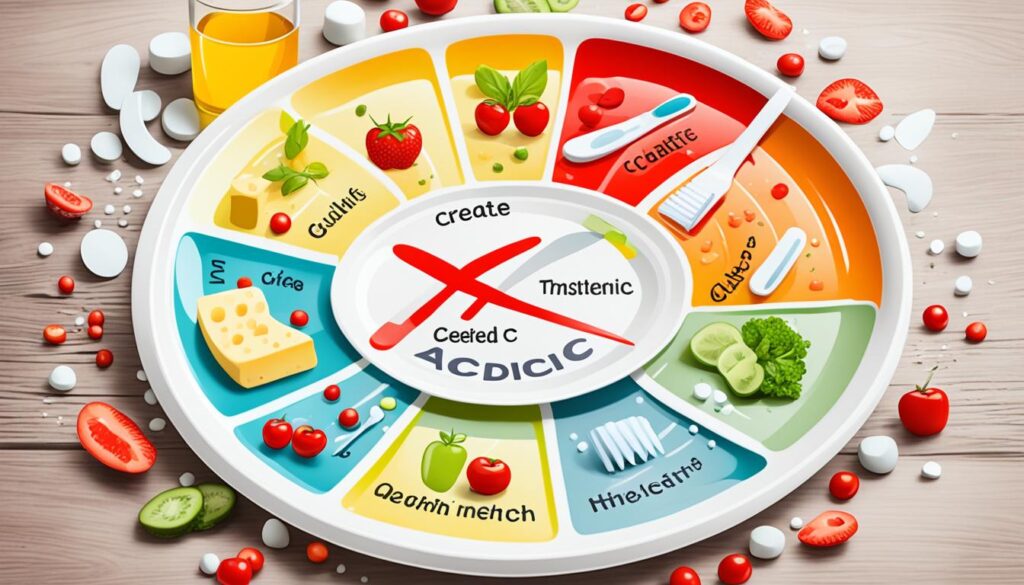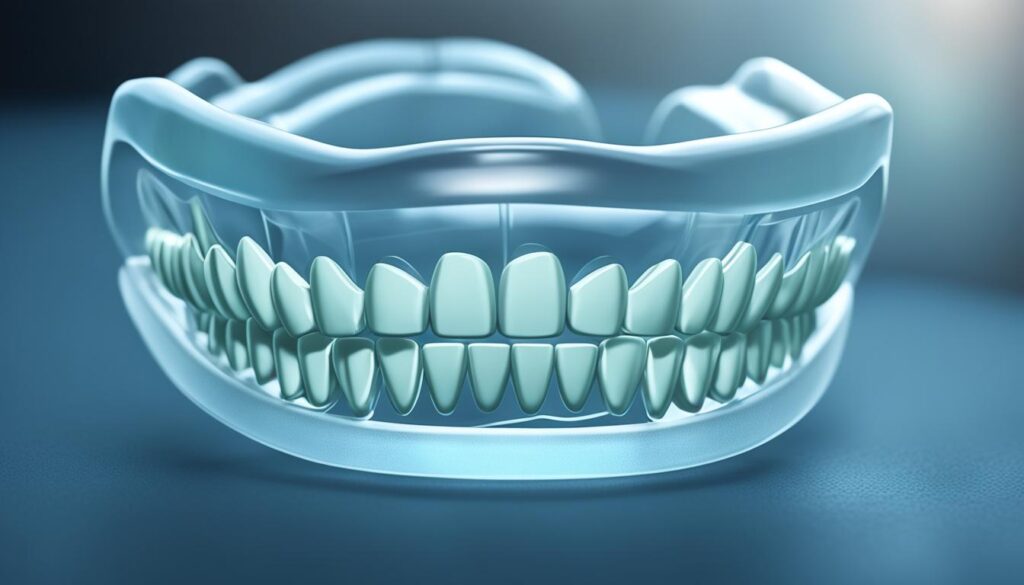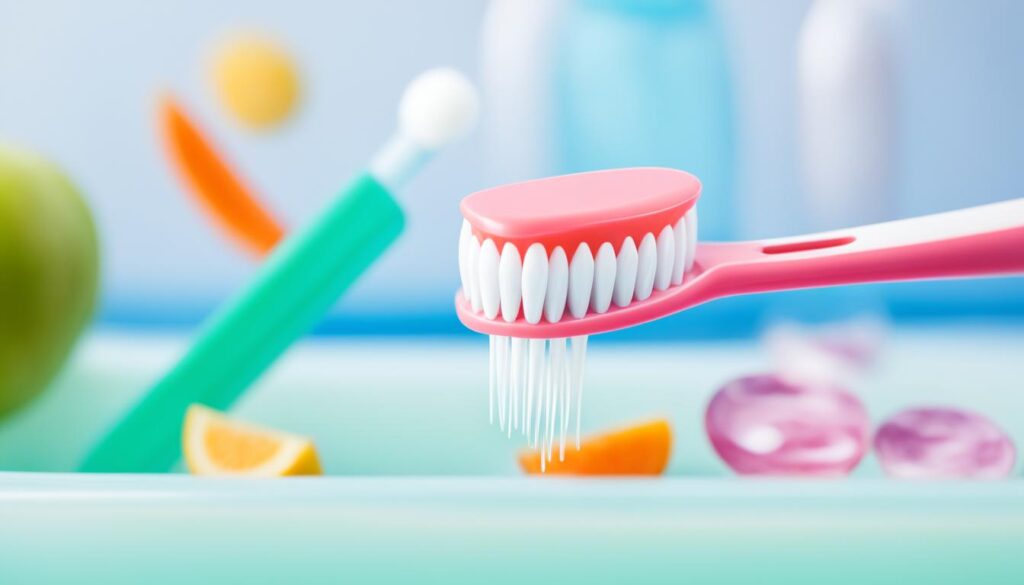Medically reviewed by Dr Chandril Chugh,
Renowned Neurologist and American Trained Specialist
Caring for your dental health is crucial not only for a confident smile but also for overall well-being. Poor oral hygiene can lead to tooth decay, gum disease, and even potential heart issues. To maintain oral health and keep your teeth and gums in optimal condition, it’s important to establish an oral hygiene routine that includes these 7 essential habits.
Table of Contents
ToggleKey Takeaways:
- Brush your teeth twice a day with a soft-bristled toothbrush and fluoride toothpaste.
- Floss daily to remove plaque and food particles from between your teeth.
- Incorporate antibacterial mouthwash into your routine to reduce plaque and bacteria.
- Eat a balanced diet rich in fruits, vegetables, and whole grains to support oral health.
- Avoid tobacco products and limit consumption of acidic foods to protect your teeth and gums.
1. Brushing and Flossing
Proper brushing and flossing are fundamental for maintaining a healthy mouth. By incorporating these essential habits into your daily oral hygiene routine, you can effectively protect your teeth and gums from plaque buildup, cavities, and gum disease.
Start by brushing your teeth twice a day, preferably in the morning and before bedtime. Use a soft-bristled toothbrush and fluoride toothpaste to gently clean your teeth and remove plaque. Remember to brush all surfaces of your teeth, including the front, back, and chewing surfaces. Use circular motions to effectively clean your teeth and gums.
To ensure thorough cleaning, don’t forget to floss daily. Using a gentle back-and-forth motion, carefully guide the floss between your teeth and along the gumline. This helps remove plaque and food particles that may be trapped in these hard-to-reach areas.
Why Brushing and Flossing are Important
Brushing and flossing play complementary roles in maintaining oral health. Brushing removes plaque from the surfaces of your teeth, while flossing targets plaque and debris between your teeth and along the gumline. These practices prevent the accumulation of bacteria and plaque, helping to prevent cavities, gum disease, and bad breath.
Tips for Effective Brushing and Flossing
- Brush your teeth twice a day, for at least two minutes each time.
- Choose a soft-bristled toothbrush to avoid damaging your tooth enamel and gums.
- Use fluoride toothpaste to strengthen your tooth enamel and protect against cavities.
- Hold your toothbrush at a 45-degree angle and use gentle, circular motions.
- Make sure to clean all surfaces of your teeth, including the front, back, and chewing surfaces.
- Floss daily using a gentle back-and-forth motion to remove plaque and food particles.
- Avoid snapping or jerking the floss, as it may harm your gums.
| Benefits of Brushing and Flossing | |
|---|---|
| Prevents Cavities | Regular brushing and flossing help remove plaque, which is the leading cause of tooth decay. |
| Prevents Gum Disease | Effective oral hygiene prevents the buildup of plaque and tartar, reducing the risk of gum disease. |
| Eliminates Bad Breath | By removing plaque and food particles, brushing and flossing help keep your breath fresh. |
| Enhances Overall Health | Poor oral hygiene has been linked to various health issues, including heart disease and diabetes. Brushing and flossing promote overall well-being. |
2. Using Mouthwash and Eating a Balanced Diet
Incorporating an antibacterial mouthwash into your oral hygiene routine can help reduce plaque buildup and eliminate bacteria in your mouth. Opt for an antibacterial mouthwash that contains fluoride, as it aids in cavity prevention and strengthens tooth enamel.
Alongside regular use of mouthwash, maintaining a balanced diet is essential for good oral health. Consuming a variety of fruits, vegetables, and whole grains provides your body with essential nutrients that promote healthy teeth and gums.
Avoiding sugary foods and drinks is crucial as they contribute to tooth decay. Instead, opt for nutritious snacks and beverages that support oral health. Let’s dive deeper into the benefits of using mouthwash and embracing a balanced diet.
Benefits of Using Mouthwash
Mouthwash can be a valuable addition to your oral hygiene routine, offering several benefits:
- Reducing plaque: Antibacterial mouthwashes help reduce the accumulation of plaque on teeth and gums.
- Eliminating bacteria: Mouthwash effectively eliminates harmful bacteria in your mouth, minimizing the risk of oral infections.
- Freshening breath: Using mouthwash can help combat bad breath, leaving your mouth feeling refreshed and clean.
Incorporate mouthwash into your daily routine after brushing and flossing, following the instructions on the product label for optimal results.
The Importance of a Balanced Diet
A balanced diet plays a significant role in maintaining good oral health. Here’s why:
- Fruits and vegetables: Rich in vitamins and minerals, fruits and vegetables support the health of your teeth and gums by providing essential nutrients.
- Whole grains: Whole grains such as brown rice and whole wheat bread are excellent sources of fiber, promoting a healthy mouth.
Avoiding sugary foods and drinks is crucial as they increase the risk of tooth decay. Instead, opt for healthier alternatives like fresh fruits or unsweetened beverages.
Remember, maintaining a balanced diet alongside proper oral hygiene practices contributes to strong teeth, healthy gums, and an overall radiant smile. Be mindful of the foods you consume and make conscious choices to support your oral health.
Now, let’s take a closer look at how to incorporate mouthwash and a balanced diet into your daily routine.
3. Avoid Tobacco Products and Limit Acidic Foods
Tobacco products, such as cigarettes and chewing tobacco, can have detrimental effects on your teeth and gums, leading to stained teeth, bad breath, and an increased risk of gum disease. It is crucial to avoid using tobacco products to maintain optimal oral health.
In addition to avoiding tobacco, it is important to limit the consumption of acidic foods and drinks. Acidic foods can erode tooth enamel over time, leaving your teeth vulnerable to decay and sensitivity. To minimize the negative effects, rinse your mouth with water after consuming acidic foods or beverages to neutralize the acidity.

4. Avoid Teeth Grinding and See Your Dentist Regularly
Teeth grinding, also known as bruxism, can cause severe damage to your teeth and gums. If you find yourself grinding your teeth at night, it is essential to take steps to protect them. Consider using a mouthguard specifically designed for bruxism, which can help cushion your teeth and prevent further damage.
Along with using a mouthguard, it is crucial to see your dentist regularly for routine check-ups. Your dentist can detect any signs of teeth grinding or bruxism early on and provide necessary treatment to prevent further complications. They may also recommend routine cleanings and examinations every six months to maintain optimal oral health.

Early Detection and Prevention
Early detection of teeth grinding is key to preventing long-term damage. By addressing the issue promptly, you can protect your teeth and gums from further harm. Regular dental visits play a vital role in early detection, as your dentist can identify signs of bruxism, such as worn-down teeth or jaw pain. They can then recommend suitable treatment options.
Maintaining Oral Health
Regular dental check-ups are not just important for detecting teeth grinding; they also play a crucial role in maintaining overall oral health. During these visits, your dentist will perform routine cleanings and examinations, which help remove plaque, tartar, and any potential early signs of tooth decay. With proper oral hygiene and regular dental care, you can protect your teeth and gums and enjoy a healthy smile.
5. Hydration and Vitamin Intake
Proper hydration plays a key role in maintaining optimal oral health. By increasing your water intake, you can wash away food particles and keep saliva levels high. This helps prevent dry mouth, a condition that can lead to bad breath and an increased risk of tooth decay.
In addition to staying hydrated, it is important to ensure an adequate intake of vitamins and minerals that promote oral health. Vitamins C and D, along with calcium, are particularly beneficial for having stronger gums and preventing gum disease.
| Vitamins and Minerals | Role in Oral Health | Sources |
|---|---|---|
| Vitamin C | Boosts collagen production, supporting gum tissue health | Citrus fruits, strawberries, bell peppers |
| Vitamin D | Promotes calcium absorption for stronger teeth and gums | Fatty fish, fortified dairy products, sunlight exposure |
| Calcium | Strengthens teeth and jawbone, supporting gum health | Dairy products, kale, broccoli |
By incorporating a variety of these nutrient-rich foods into your diet, you can improve your oral health and reduce the risk of developing gum disease. Remember to consult with a healthcare professional or registered dietitian for personalized dietary recommendations.

Summary:
Increasing your water intake and staying hydrated helps maintain saliva levels and prevent dry mouth. Including sources of vitamins C and D, as well as calcium, in your diet can strengthen your gums and promote better oral health. By prioritizing hydration and vitamin intake, you can take proactive steps towards a healthier smile.
6. Managing Stress and Educating Family
High stress levels can have a negative impact on your gum and dental health. One common consequence of stress is bruxism, which is the grinding or clenching of teeth. Bruxism can lead to various dental problems, including tooth damage and jaw disorders.
Fortunately, there are effective ways to manage and reduce stress in order to maintain optimal oral well-being. One powerful technique is meditation, which promotes relaxation and reduces stress levels. Take a few minutes each day to sit quietly, focus on your breath, and let go of tension. This can help alleviate the pressure on your teeth and gums caused by stress.
In addition to meditation, regular exercise is another great way to manage stress levels. Physical activity releases endorphins, which are natural mood boosters. Engaging in activities like jogging, swimming, or practicing yoga can help reduce stress and promote better oral health.
Aside from personal stress management, it’s important to educate your family, especially children, about good oral hygiene practices. Instilling good habits early on can significantly contribute to their dental health. Teach them the importance of brushing their teeth twice a day with fluoride toothpaste, flossing daily, and maintaining a balanced diet.
Encourage your family to visit the dentist regularly for routine check-ups and cleanings. A regular dental care regimen can help prevent dental issues and ensure a lifetime of healthy smiles. Take the time to educate your loved ones about the importance of oral hygiene, and they will thank you for it in the long run.
Benefits of Stress Management and Oral Hygiene Education:
- Reduces the risk of bruxism and teeth grinding
- Promotes healthier teeth and gums
- Enhances overall well-being
- Prevents dental problems and decay
- Creates a positive oral health routine for children
| Techniques for Managing Stress | Oral Hygiene Education for Children |
|---|---|
|
|

7. Dentures and Dry Mouth
In cases of tooth loss or severe damage, dentures may be necessary to replace missing teeth. Dentures are removable appliances that can be full or partial, depending on the number of missing teeth. Full dentures are used when all teeth are missing, while partial dentures are used to fill in gaps caused by missing teeth.
Proper dental hygiene is essential for maintaining the health and longevity of dentures. Cleaning dentures regularly helps prevent oral issues such as gum disease and bad breath. Here are some tips for proper denture care:
- Remove and rinse dentures after eating to remove food debris and prevent stains.
- Brush dentures daily using a soft-bristled brush and non-abrasive denture cleaner or mild soap. Avoid using regular toothpaste, as it can be too abrasive and damage the denture material.
- Soak dentures overnight in a denture-cleaning solution to keep them moist and clean.
- Handle dentures with care to avoid dropping or bending them.
- Visit your dentist regularly for check-ups and adjustments to ensure a proper fit and functioning dentures.
Dry mouth, also known as xerostomia, can be a common issue for denture wearers. It occurs when the mouth cannot produce enough saliva, which is crucial for lubrication, digestion, and protecting against tooth decay. Dry mouth can lead to discomfort, difficulty speaking and swallowing, and an increased risk of oral infections. Here are some tips to manage dry mouth:
- Stay hydrated by sipping water or sugarless drinks throughout the day.
- Avoid tobacco and alcohol, as they can worsen dry mouth symptoms.
- Use artificial saliva or saliva substitutes to help moisturize the mouth and alleviate dryness. These products are available over-the-counter.
It is important to consult with your dentist if you experience persistent dry mouth, as they can provide additional recommendations or prescribe medication to stimulate saliva production.
Remember, proper dental hygiene, regular visits to the dentist, and following these tips for denture care and managing dry mouth can help ensure the health and comfort of your dentures and maintain optimal oral health.
Conclusion
Maintaining healthy teeth and gums is essential for your overall well-being. By incorporating these 7 daily oral hygiene habits into your routine, you can ensure optimal oral health and enjoy a radiant smile for a lifetime.
Remember to brush and floss your teeth regularly to remove plaque and prevent cavities. Use a soft-bristled toothbrush and fluoride toothpaste, and gently brush in circular motions. Don’t forget to floss daily to remove plaque and food particles from between your teeth.
In addition to brushing and flossing, using mouthwash can further support your oral health. Choose an antibacterial mouthwash to reduce plaque and a fluoride mouthwash for cavity prevention. Alongside your oral hygiene routine, maintain a balanced diet rich in fruits, vegetables, and whole grains while limiting sugary foods and drinks to safeguard against tooth decay.
Managing stress, seeing your dentist regularly, and taking care of dentures or dry mouth concerns are also vital for maintaining healthy teeth and gums. By following these daily oral hygiene habits, you can ensure optimal oral health and enjoy a beautiful smile for years to come.
FAQ
What are the 7 essential habits for maintaining healthy teeth and gums?
The 7 essential habits for maintaining healthy teeth and gums are brushing and flossing, using mouthwash and eating a balanced diet, avoiding tobacco products and limiting acidic foods, avoiding teeth grinding and seeing your dentist regularly, maintaining hydration and vitamin intake, managing stress and educating your family, and taking care of dentures and dry mouth concerns.
How often should I brush my teeth?
It is recommended to brush your teeth twice a day with a soft-bristled toothbrush.
How often should I floss?
It is important to floss daily to remove plaque and food particles from between your teeth.
What type of toothbrush should I use?
It is best to use a soft-bristled toothbrush for brushing your teeth.
What type of toothpaste should I use?
You should choose a toothpaste that contains fluoride to prevent cavities.
How should I brush and floss my teeth?
When brushing your teeth, use circular motions with gentle back-and-forth motions when flossing. Avoid snapping or jerking movements.
How can mouthwash help in maintaining oral health?
Incorporating an antibacterial mouthwash into your routine can help reduce plaque and bacteria in the mouth.
What should I include in my diet for healthy teeth and gums?
Eating a balanced diet rich in fruits, vegetables, and whole grains can help keep your mouth healthy. Avoiding sugary foods and drinks is also important to prevent tooth decay.
Why should I avoid tobacco products?
Tobacco products such as cigarettes and chewing tobacco can cause stained teeth, bad breath, and increase the risk of gum disease.
How can I limit the consumption of acidic foods?
It is recommended to rinse your mouth with water after consuming acidic foods or beverages to neutralize the acidity. Limiting the consumption of acidic foods and drinks can help protect tooth enamel.
How can I protect my teeth and gums if I grind my teeth?
If you grind your teeth at night, consider using a mouthguard to protect them.
How often should I see my dentist?
Most dentists recommend routine cleanings and exams every six months to maintain healthy teeth and gums.
How can staying hydrated contribute to oral health?
Staying hydrated by drinking water helps wash away food particles and keeps saliva levels high, preventing dry mouth.
How can vitamins contribute to healthier gums?
Adequate vitamin intake, especially vitamins C and D, along with calcium, contributes to healthier gums and can help prevent gum disease.
How can managing stress affect oral health?
High stress levels can negatively affect gum and dental health, leading to conditions like teeth grinding. Managing stress through techniques like meditation and regular exercise can help maintain oral well-being.
Why is it important to educate my family about oral hygiene?
It is important to educate your family, especially children, about good oral hygiene practices. Instilling good habits early on can prevent tooth decay and ensure a lifetime of healthy smiles.
How should I take care of my dentures?
If you have dentures, it is important to care for them properly by keeping them clean and free from food particles that can cause stains or bad breath.
How can I manage dry mouth?
Dry mouth can be a challenge for oral health. Sipping water or sugarless drinks, avoiding tobacco and alcohol, and using artificial saliva can help manage dry mouth symptoms.
Source Links

This article is medically reviewed by Dr. Chandril Chugh, Board-Certified Neurologist, providing expert insights and reliable health information.
Dr. Chandril Chugh is a U.S.-trained neurologist with over a decade of experience. Known for his compassionate care, he specializes in treating neurological conditions such as migraines, epilepsy, and Parkinson’s disease. Dr. Chugh is highly regarded for his patient-centered approach and dedication to providing personalized care.








